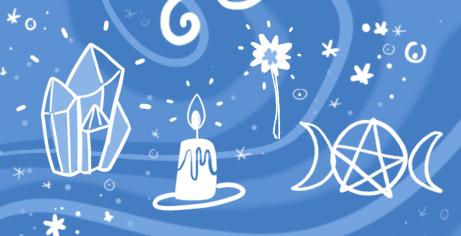Smells Like Teen Spirit: Millennials and Alternative Spirituality
March 26, 2018
Whether you think of “The Wizard of Oz” or “Practical Magic,” the symbol of the witch is widely recognized throughout western society. And whether you’re searching at Urban Outfitters for spell books and healing crystals or at Free People for love potions and tarot cards, it’s clear witchcraft and symbols of alternative spirituality are everywhere. Wicca, a pre-Christian religion, believes in and practices magic, it originated spell books and symbols that can be found being worn and used by millenials.
Why are so many young people turning to these forms of religion and spirituality in the first place? LS first-year Layla Passman has some thoughts.
“Many millennials have rejected mainstream religion so maybe they’re attracted to different ways to become spiritual,” Passman said. “Conforming to a set of rules is unattractive.”
Many people have rejected the religions they grew up following, feeling a dissonance from them due to their structures. On the other hand, religions — like Wicca — and practices — such as the use of healing crystals — are incredibly focused on the individual. These spiritualities and religions tend to be open-ended, making them attractive to a generation of people who tend to reject institutions that were established before them.
“We have to question everything being apart of this generation,” Stern first-year Nahb Babar said. “It’s like, I don’t believe in God, but I think I believe in a higher power.”
This combination of rebelling against tradition and still having a desire for spirituality have led many millennials to seek out other ways to become in touch with themselves or an abstract form of a higher power without having to subscribe to an organized religion.
However, while many are turning towards Wicca for spiritual satiation, the term witch has begun to take on a new form in popular culture.
“Witch describes powerful women,” Passman said. “A bad b-tch who doesn’t let anything get in her way.”
Recently, women have reclaimed the term “witch” as a way to celebrate and embrace feminine power. “Broad City,” a TV show popular among millennials, even uses #witchcrushwednesday to share pieces of the history of strong and powerful women on a weekly basis. While this is a positive message to promote, the idea of witchcraft has drifted into becoming a mindless trend.
“I think people think its quirky,” a Wiccan student who chose to remain anonymous said.
The intention to find spirituality has faded into the background as the appeal to cultivating a spiritual aesthetic has become more focused.
“I think people feel like it adds a whimsy or mysticism of sorts to like everyday life,” Passman said.
People treat witchcraft like a sleepover activity similar to the light as a feather, stiff as a board game that we all tried and failed at in elementary school. The novelty of witchcraft is being highlighted over the actual practice.
However, it’s hard to not think of this trend as somewhat appropriative. Wicca, like all religions, has a long and complex history rooted in tradition and culture.
“I have friends whose parents raised them on Wicca and they really feel slighted by people who pick it up [in] Barnes and Noble,” the anonymous Wiccan student said.
Further, astrology and crystal healing are both integral aspects of Hinduism.
“I grew up watching my mom using crystals as apart of how she worshiped, its always been apart of the Hindu culture I grew up in,” Babar said. “It’s quite strange seeing something I’ve always known as spiritual being used without the knowledge of what it’s really from.”
There’s a feeling of being forgotten among the communities where these forms of spirituality originate.
It is clear that practitioners of the religions where these aspect of spirituality come from, such as Wicca and Hinduism, aren’t going anywhere; Hinduism is the world’s third largest faith after all. However, for those who have been attracted to these forms of religion and spirituality for the aesthetic, it seems to be nothing more than a trend. While trends come and go quickly, it is important to recognize and respect where they come from.
Email Scott Hogan at [email protected]




























































































































































